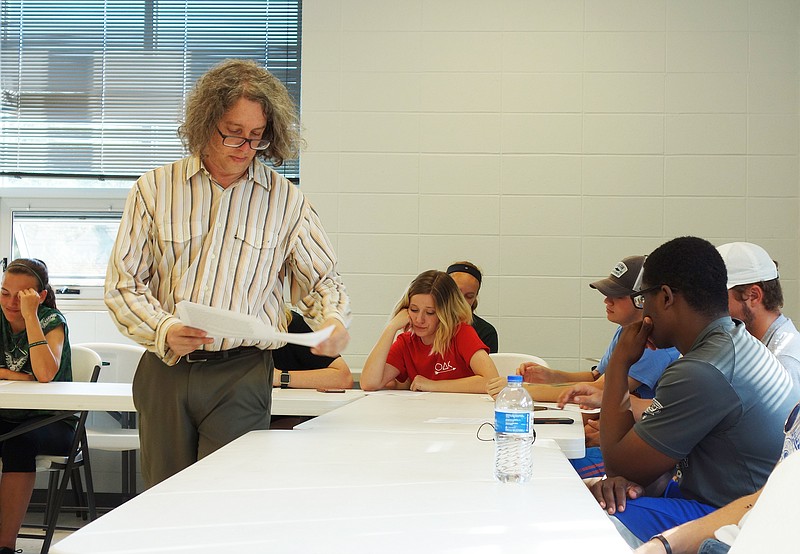To William Woods University professor Matt Dube, 2019 One Read choice "Nomadland" is a profoundly sad book.
The nonfiction book, by Jessica Bruder, is populated with older Americans living out of their vehicles, traveling from grueling temporary job to grueling temporary job. With no savings or social safety net, these modern nomads are one inevitable injury away from losing what little they have left.
"These people may die one page after the book ends," he said.
The byproduct of the Great Recession, these self-identified "houseless" itinerant workers are an often-overlooked and seemingly permanent part of the American economy.
"I don't think the houseless are a temporary blip," he said. "They're not going to go away in six months if we elect Bernie Sanders president."
For advice on how to aid these rambling Baby Boomers, Dube turned to their predecessors and literary cousins: the Beat Generation. In Dube's Monday talk at Wiliam Woods, he drew parallels between the two groups.
Dube primarily focused on two of the generation's literary greats: author Jack Kerouac and poet Gary Snyder. In Kerouac's seminal "On the Road," he sets forth hitchhiking from New Jersey with the goal of reaching San Francisco in 10 days. All does not go as planned.
Instead, Kerouac ends up relying on the charity of friends, partying and working a series of odd jobs, including as a cotton farm worker.
Though the nomads in Bruder's book might have different reasons for hitting the road - namely, poverty and lack of housing following the great Recession - they face many of the same challenges, and worse, Dube said.
For one, there are the many inconveniences of life on the road, from a lack of space to the difficulties of staying warm, bathing and cooking.
The people of Nomadland tackle those challenges with aplomb, none more than Bob Wells, the author of the "Homes on Wheels Alliance" blog and founder of the Rubber Tramp Rendezvous. In his blog, Wells shares tips for making a four-wheeled vehicle into a livable home.
But Wells is also given to writing that seems to channel people like Kerouac.
"There has always been a small group that could not resist the lure of individuality, travel and adventurethey had to know what was around the next corner and over the next mountain," Wells writes in an update post about the Rendezvous. "Those people pulled away from the tribe and followed the beat of a different drummer. They are the nomads, gypsies and adventurers who changed and shaped our world."
"The same enthusiasm runs through both writers," Dube said.
The "Nomadland" characters also share a love of nature with the Beats. Many Beatniks sought jobs as fire-watchers in forests, much as many of Nomadland's itinerant workers work at campsites for the National Parks. Snyder wrote movingly about oneness with nature and how a nomadic life encourages it.
"But it's not this fun Gary Snyder-esque 'I'm going to be in tune with nature (experience),'" Dube said. "You're like a hall monitor."
Campsite monitors must clean up after guests and keep them from causing partying-related problems, among other chores.
Many roaming workers also do stints in agricultural labor - for example, sorting sugar beats, a job Bruder found difficult even at a relatively young age.
"You can get away with a lot at 20 that you can't at 40," Dube said.
Many Beats experimented with and got hooked on drugs. That's also a challenge for the people described in Nomadland: it's easy to become addicted to painkillers following the type of injuries common among older manual laborers.
And they have even less of a safety net than Kerouac and his fellow Beats did.
"If they couldn't get a job, they'd go to a welfare office and sign up for food stamps and stay at a YMCA," Dube said. "It's much harder to qualify for benefits these days."
He emphasized the importance of safety nets in ensuring the well-being of people like Nomadland's characters.
"The Beats understood the importance of networks: friends and family," he said.
Building social connection at events like the Rubber Tramp Rendezvous helps ensure the modern workers have someone to turn to for help. Restoring the social safety net would help too, Dube said.

